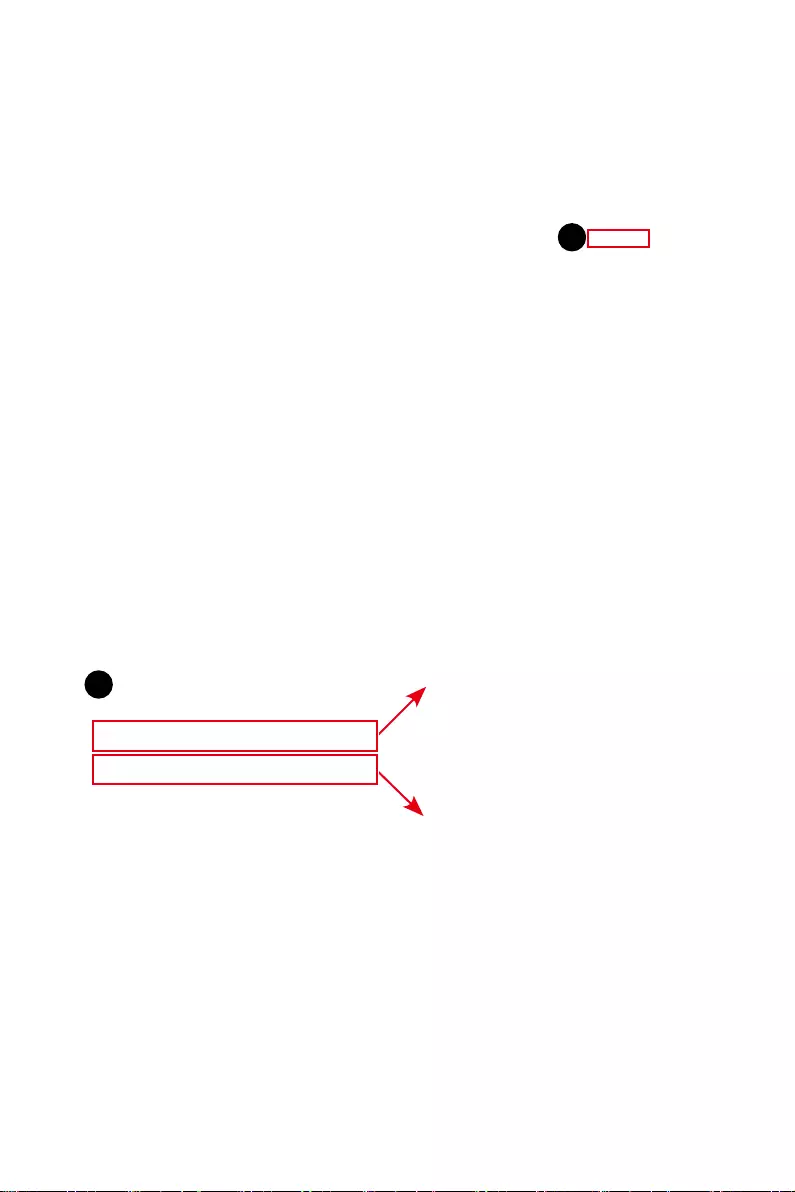Table of Contents
MSI Ti5 12VTF-092AU User Manual
Displayed below is the user manual for Ti5 12VTF-092AU by MSI which is a product in the PCs/Workstations category. This manual has pages.
Related Manuals

Aegis Series
Personal Computer
Aegis B939
User Guide

2Contents
Contents
Getting Started .............................................................................................................. 3
Package Contents ................................................................................................... 3
Safety & Comfort Tips ............................................................................................ 3
System Overview..................................................................................................... 4
Hardware Setup ...................................................................................................... 8
Windows 10 System Operations ................................................................................ 10
Power Management ............................................................................................. 10
Network Connection ............................................................................................. 12
System Recovery .................................................................................................. 15
Windows 11 System Operations ................................................................................ 19
Power Management ............................................................................................. 19
Network Connections ........................................................................................... 23
System Recovery .................................................................................................. 31
F3 Hotkey Recovery (Optional) .................................................................................. 33
Safety Instructions ...................................................................................................... 34
Regulatory Notices ..................................................................................................... 36
Revision
V1.0, 2021/11

3
Getting Started
Getting Started
This chapter provides you with the information on hardware setup procedures. While
connecting devices, be careful in holding the devices and use a grounded wrist strap
to avoid static electricity.
Package Contents
Personal Computer Aegis B939
Documentation
User Guide (Optional)
Quick Guide (Optional)
Warranty Book (Optional)
Accessories
Power Cord
Mouse (Optional)
Keyboard (Optional)
2.5”/3.5” SATA Cable (Optional)
3.5” HDD Bracket (Optional)
2.5” Screws (Optional)
⚠
Important
∙
Contact your place of purchase or local distributor if any of the items is damaged or
missing.
∙
Package contents may vary by country.
∙
The included power cord is exclusively for this personal computer and should not be
used with other products.
Safety & Comfort Tips
∙Choosing a good workspace is important if you have to work with your PC for a long
period of time.
∙Your work area should have enough illumination.
∙Choose the proper desk and chair and adjust their height to fit your posture when
operating.
∙When sitting on the chair, sit straight and keep a good posture. Adjust the chair’s
back (if available) to support your back comfortably.
∙Place you feet flat and naturally on the floor, so that your knees and elbows have the
proper position (about 90-degree) when operating.
∙Put your hands on the desk naturally to support your wrists.
∙Avoid using your PC in a place where discomfort may occur (such as on the bed).
∙The PC is an electrical device. Please treat it with great care to avoid personal
injury.

4Getting Started
System Overview
1 1
2
9
10
13
1211
1010101015
14
16
17
18
19
20
21
22 23
25
3
4 5 6 7 4 8
24

5
Getting Started
1Headset Holder
Pull out the hanger, then a headset can be hung on the holder.
2Gaming Dial
Gaming Dial displays system information and supports quick switch
between functions like Mystic Light/ audio volume or game launch.
3Power Button / Power LED
The power LED glows when the system is turned on and goes off when
the system is shut down. In terms of power saving, the LED blinks in S3
(Suspend to RAM) mode and goes off in S4 (Suspend to Disk) mode.
4USB 3.2 Gen 1 Port
This connector is provided for USB peripheral devices. (Speed up to 5 Gbps)
5Microphone Jack
6Headphone Jack
7USB 3.2 Gen 2 Port (Type-C)
This connector is provided for USB peripheral devices. (Speed up to 10
Gbps)
8Hard Disk Drive LED
This indicator shows the activity status of the HDD. It flashes when the
system is accessing data on the HDD and remains off when no disk activity
is detected.
9Ventilator
10 Line-In Jack
11 Line-Out Jack
12 Mic-In Jack
13 CS-Out Jack
Center/ subwoofer line out in 5.1/ 7.1 channel mode.
14 RS-Out Jack
Rear surround sound line out in 4/ 5.1/ 7.1 channel mode.

6Getting Started
15 S/PDIF-Out
This S/PDIF (Sony & Philips Digital Interconnect Format) connector is
provided for digital audio transmission to external speakers through an
optical fiber cable.
16 2.5 Gbps LAN Jack
The standard RJ-45 LAN jack is provided for connection to the Local Area
Network (LAN). You can connect a network cable to it.
LINK/ACT
LED
SPEED
LED
LED Status Description
Link/ Activity
LED
Off No link
Yellow Linked
Blinking Data activity
Speed LED
Off 10 Mbps
Green 100/1000 Mbps
Orange 2.5 Gbps
17 USB 3.2 Gen 2 Port
This connector is provided for USB peripheral devices. (Speed up to 10
Gbps)
18 USB 3.2 Gen 2x2 Port (Type-C)
This connector is provided for USB peripheral devices. This connector can
provide up to 5V/3A of power. (Speed up to 20 Gbps)
19 LAN Jack
The standard RJ-45 LAN jack is provided for connection to the Local Area
Network (LAN). You can connect a network cable to it.
LINK/ACT
LED
SPEED
LED
LED Status Description
Link/ Activity
LED
Off No link
Yellow Linked
Blinking Data activity
Speed LED
Off 10 Mbps
Green 100 Mbps
Orange 1 Gbps

7
Getting Started
20 Thunderbolt™ 4 Port (USB Type-C) (Optional)
∙Support up to 40Gbps transfer rate with Thunderbolt devices.
∙Support up to 20Gbps transfer rate with USB 3.2 Gen 2x2 devices.
∙Support up to 10Gbps transfer rate with USB 3.2 devices.
∙Support up to 5V/3A, 9V/3A, 15V/3A, and 20V/3A power charging
∙Each port can daisy-chain up to three Thunderbolt 4 devices or five
Thunderbolt 3 devices.
∙Support up to 8K display.
21 HDMI 1.4b Port
Supports a maximum resolution of 4K 30Hz.
⚠
Important
∙
Graphics specifications may vary depending on the installed CPU.
∙
For processors without integrated graphics, connect your monitor to the
discrete graphics card.
22 PS/2® Keyboard/ Mouse Port
23 USB 2.0 Port
This connector is provided for USB peripheral devices. (Speed up to 480
Mbps)
⚠
Important
High-speed devices are recommended for USB 3.2 ports whereas low-
speed devices, such as mouse or keyboard, are suggested to be plugged
into the USB 2.0 ports.
24 Kensington Lock Port
This PC provides a Kensington lock port, which allows users to secure the
PC in place with a key or some mechanical PIN device and attached through
a rubberised metal cable. The end of the cable has a small loop which
allows the whole cable to be looped around a permanent object, such as a
heavy table or other similar equipment, thus securing the PC in place.
25 Power Jack

8Getting Started
Hardware Setup
Connect your peripheral devices to suitable ports.
⚠
Important
∙
For detailed instructions on how to connect, please refer to the manuals of your
peripheral devices.
∙
Reference image only. Appearance will vary.
Connecting Thunderbolt Devices via Daisy-chain (Optional)
Daisy-chain is a method of connecting multiple devices to a PC with only one output
terminal. Daisy-chain allows you to connect multiple Thunderbolt devices to a single
Thunderbolt port on the rear I/O panel.
You can also daisy-chain monitors on the rear I/O panel. Please note that monitors
should be the last devices on the chain.
If you want to connect USB devices, please place them at the end of the chain.

9
Getting Started
Connect the power cord to the system and electrical outlet.
Power Rating
•850W: 100-240V~, 50-60Hz, 12V-6A
Press the power button to power on the system.
⚠
Important
When unplugging the AC power cord,
always hold the connector part of the
cord. Never pull the cord directly.

10 Windows 10 System Operations
Windows 10 System Operations
This chapter provides you with essential information on system operations.
⚠
Important
All information is subject to change without prior notice.
Power Management
Power management of personal computers (PCs) and monitors has the potential to
save significant amounts of electricity as well as deliver environmental benefits.
To be energy efficient, turn off your display or set your PC to sleep mode after a period
of user inactivity.
Power Management in Windows 10
∙[Power Options] in Windows OS allow you to control the power management
features of your display, hard drive, and battery. Right-click [Start] , select
[Control Panel] from the list and then click [System and Security].
∙Select [Power Options] and choose a power plan that suits your personal needs. You
may also fine-tune the settings by clicking [Change plan settings].
∙The Shut Down Computer menu presents the options of Sleep (S3/S4) & Shut Down
(S5) for rapid and easy management of your system power.
Power Management
The power management feature allows the computer to initiate a low-power or
“Sleep” mode after a period of user inactivity. To take advantage of these potential
energy savings, the power management feature has been preset to behave in the
following ways when the system is operating on AC power:
∙Turn off the display after 10 minutes
∙Initiate Sleep after 30 minutes

11
Windows 10 System Operations
Waking the System Up
The computer shall be able to wake up from power saving mode in response to a
command from any of the following:
∙the power button,
∙the network (Wake On LAN),
∙the mouse,
∙the keyboard.
Energy Saving Tips:
∙Turn off the monitor by pressing the monitor power button after a period of user
inactivity.
∙Tune the settings in Power Options under Windows OS to optimize your PC’s power
management.
∙Install power saving software to manage your PC’s energy consumption.
∙Always disconnect the AC power cord or switch the wall socket off if your PC would
be left unused for a certain time to achieve zero energy consumption.

12 Windows 10 System Operations
Network Connection
Wired Network
1. Right-click [Start] and select [Network Connections] from the list.
2. Select [Ethernet] and then [Network and Sharing Center].
3. Select [Set up a new connection or network].
4. Choose [Connect to the Internet] and click [Next].

13
Windows 10 System Operations
5. Select [Broadband (PPPoE)] to connect using DSL or cable that requires a user
name and password.
6. Type the information from your Internet Service Provider (ISP) and click [Connect]
to establish your LAN connection.

14 Windows 10 System Operations
Wireless Network
1. Go to [Start] , click [Settings] and select [Network and Internet].
2. A list of available WLAN connections pops up. Choose a connection from the list.
3. To establish a new connection, select [Network and Sharing Center].
4. Select [Set up a new connection or network].
5. Followingly, choose [Manually connect to a wireless network] and click [Next] to
continue.
6. Enter information for the wireless network you intend to add and click [Next] to
proceed.
7. A new WLAN connection has been made.

15
Windows 10 System Operations
System Recovery
The purposes for using the System Recovery Function may include:
∙Restore the system back to the initial status of original manufacturer’s default
settings.
∙When some errors have occurred to the operating system in use.
∙When the operating system is affected by virus and is not able to work normally.
∙When you want to install the OS with other built-in languages.
Before using the System Recovery Function, please back up the important data saved
on your system drive to other storage devices.
If the following solution fails to recover your system, please contact the authorized
local distributor or service center for further assistance.

16 Windows 10 System Operations
Reset this PC
1. Go to [Start] , click [Settings] and select [Update and security].
2. Select [Recovery] and click [Get started] under [Reset this PC] to start the system
recovery.
3. The [Choose an option] screen pops up. Choose between [Keep my files] and
[Remove everything].
Reset this PC Keep my files
Remove
everything
Only the drive
where Windows is
installed
Just remove my files
Remove files and clean the
drive
All drives Just remove my files
Remove files and clean the
drive

17
Windows 10 System Operations
Keep my files
1. Select [Keep my files].
2. The [Your apps will be removed] screen shows a list of apps that will need to be
reinstalled from the web or installation discs. Click [Next] to continue.
3. The next screen will show the changes to be made during the process. Click
[Reset] to start the system reset.

18 Windows 10 System Operations
Remove everything
1. Select [Remove everything].
2. If you have multiple hard drives, a screen will pop up, asking you to choose
between [Only the drive where Windows is installed] and [All drives].
3. Then select between [Just remove my files] and [Remove files and clean the drive].
4. The next screen will show the changes to be made during the process. Click
[Reset] to start the system reset.

19
Windows 11 System Operations
Windows 11 System Operations
⚠
Important
All information and Windows screenshots are subject to change without prior notice.
Power Management
Power management of personal computers (PCs) and monitors has the potential to
save significant amounts of electricity as well as deliver environmental benefits.
To be energy efficient, turn off your display or set your PC to sleep mode after a period
of user inactivity.
1. Right-click [Start] and select [Power Options] from the list.
2. Adjust [Screen and sleep] settings and select a power mode from the list.
3. To choose or customize a power plan, type control panel in the search box and
select [Control Panel].
4. Open up [All Control Panel Items] window. Select [Large icons] under [View by]
drop-down menu.
5. Select [Power Options] to continue.
6. Select a power plan and fine-tune the settings by clicking [Change plan settings].
7. To create your own power plan, select (Create a power plan).
8. Select an existing plan and give it a new name.
9. Adjust settings for your new power plan.
10. The [Shut down or sign out] menu also presents power saving options for rapid and
easy management of your system power.
Energy Savings
The power management feature allows the computer to initiate a low-power or
“Sleep” mode after a period of user inactivity. To take advantage of these potential
energy savings, the power management feature has been preset to behave in the
following ways when the system is operating on AC power:
∙Turn off the display after 10 minutes
∙Initiate Sleep after 30 minutes
Waking the System Up
The computer shall be able to wake up from power saving mode in response to a
command from any of the following:
∙the power button,
∙the network (Wake On LAN),
∙the mouse,
∙the keyboard.
Energy Saving Tips:
∙Turn off the monitor by pressing the monitor power button after a period of user
inactivity.

20 Windows 11 System Operations
∙Tune the settings in Power Options under Windows OS to optimize your PC’s power
management.
∙Install power saving software to manage your PC’s energy consumption.
∙Always disconnect the AC power cord or switch the wall socket off if your PC would
be left unused for a certain time to achieve zero energy consumption.
2
3
1

21
Windows 11 System Operations
7
4
5
6

22 Windows 11 System Operations
10
8
9

23
Windows 11 System Operations
Network Connections
Wi-Fi
1. Right-click [Start] and select [Network Connections] from the list.
2. Select and turn on [Wi-Fi].
3. Select [Show available networks]. A list of available wireless networks pops up.
Choose a connection from the list.
4. To establish a new connection, select [Manage known networks].
5. Select [Add network].
6. Enter information for the wireless network you intend to add and click [Save] to
establish a new connection.
1
2

24 Windows 11 System Operations
3
4

25
Windows 11 System Operations
5
6

26 Windows 11 System Operations
Ethernet
1. Right-click [Start] and select [Network Connections] from the list.
2. Select [Ethernet].
3. The [IP assignment] and [DNS server assignment] are automatically set as
[Automatic (DHCP)].
4. For a Static IP connection, click [Edit] of [IP assignment].
5. Select [Manual].
6. Switch on the [IPv4] or [IPv6].
7. Type the information from your Internet Service Provider and click [Save] to
establish a Static IP connection.
1
2

27
Windows 11 System Operations
34
5

28 Windows 11 System Operations
6
7

29
Windows 11 System Operations
Dial-up
1. Right-click [Start] and select [Network Connections] from the list.
2. Select [Dial-up].
3. Select [Set up a new connection].
4. Choose [Connect to the Internet] and click [Next].
5. Select [Broadband (PPPoE)] to connect using DSL or cable that requires a user
name and password.
6. Type the information from your Internet Service Provider (ISP) and click [Connect]
to establish your LAN connection.
1
2

30 Windows 11 System Operations
3
4 5
6

31
Windows 11 System Operations
System Recovery
The purposes for using the System Recovery Function may include:
∙Restore the system back to the initial status of original manufacturer’s default
settings.
∙When some errors have occurred to the operating system in use.
∙When the operating system is affected by virus and is not able to work normally.
∙When you want to install the OS with other built-in languages.
Before using the System Recovery Function, please back up the important data saved
on your system drive to other storage devices.
If the following solution fails to recover your system, please contact the authorized
local distributor or service center for further assistance.
Reset this PC
1. Right-click [Start] and select [Settings] from the list.
2. Select [Recovery] under [System].
3. Click [Reset PC] to start the system recovery.
4. The [Choose an option] screen pops up. Choose between [Keep my files] and
[Remove everything] and follow the on-screen instructions to complete your
system recovery.
1
2
2

32 Windows 11 System Operations
3
4

33
F3 Hotkey Recovery (Optional)
F3 Hotkey Recovery (Optional)
Precautions for Using the System Recovery Function
1. If your hard drive and system encountered non-recoverable problems, please use
the F3 Hotkey recovery from the Hard Drive first to perform the System Recover
Function.
2. Before using the System Recovery Function, please back up the important data
saved on your system drive to other storage devices.
Recovering the system with the F3 Hotkey
Follow the instructions below to continue:
1. Restart the PC.
2. Press the F3 hotkey on the keyboard promptly when the MSI greeting appears on
the display.
3. On the [Choose an option] screen, select [Troubleshoot].
4. On the [Troubleshoot] screen, select [Restore MSI factory settings] to reset the
system to the default settings.
5. On the [RECOVERY SYSTEM] screen, select [System Partition Recovery].
6. Follow the on-screen instructions to continue and complete the Recovery Function.

34 Safety Instructions
Safety Instructions
∙Read the safety instructions carefully and thoroughly.
∙All cautions and warnings on the device or User Guide should be noted.
∙Refer servicing to qualified personnel only.
Power
∙Make sure that the power voltage is within its safety range and has been adjusted
properly to the value of 100~240V before connecting the device to the power outlet.
∙If the power cord comes with a 3-pin plug, do not disable the protective earth pin
from the plug. The device must be connected to an earthed mains socket-outlet.
∙Please confirm the power distribution system in the installation site shall provide
the circuit breaker rated 120/240V, 20A (maximum).
∙Always unplug the power cord before installing any add-on card or module to the
device.
∙Always disconnect the power cord or switch the wall socket off if the device would
be left unused for a certain time to achieve zero energy consumption.
∙Place the power cord in a way that people are unlikely to step on it. Do not place
anything on the power cord.
∙If this device comes with an adapter, use only the MSI provided AC adapter approved
for use with this device.
Battery
Please take special precautions if this device comes with a battery.
∙Danger of explosion if battery is incorrectly replaced. Replace only with the same or
equivalent type recommended by the manufacturer.
∙Avoid disposal of a battery into fire or a hot oven, or mechanically crushing or
cutting of a battery, which can result in an explosion.
∙Avoid leaving a battery in an extremely high temperature or extremely low air
pressure environment that can result in an explosion or the leakage of flammable
liquid or gas.
∙Do not ingest battery. If the coin/button cell battery is swallowed, it can cause
severe internal burns and can lead to death. Keep new and used batteries away
from children.
European Union:
Batteries, battery packs, and accumulators should not be disposed of as
unsorted household waste. Please use the public collection system to
return, recycle, or treat them in compliance with the local regulations.
Taiwan:
廢電池請回收
For better environmental protection, waste batteries should be collected
separately for recycling or special disposal.

35
Safety Instructions
California, USA:
The button cell battery may contain perchlorate material and requires
special handling when recycled or disposed of in California.
For further information please visit: https://dtsc.ca.gov/perchlorate/
Environment
∙To reduce the possibility of heat-related injuries or of overheating the device, do not
place the device on a soft, unsteady surface or obstruct its air ventilators.
∙Use this device only on a hard, flat and steady surface.
∙To prevent fire or shock hazard, keep this device away from humidity and high
temperature.
∙Do not leave the device in an unconditioned environment with a storage temperature
above60℃orbelow0℃,whichmaydamagethedevice.
∙Themaximumoperatingtemperatureisaround35℃.
∙When cleaning the device, be sure to remove the power plug. Use a piece of soft
cloth rather than industrial chemical to clean the device. Never pour any liquid into
the opening; that could damage the device or cause electric shock.
∙Always keep strong magnetic or electrical objects away from the device.
∙If any of the following situations arises, get the device checked by service personnel:
•The power cord or plug is damaged.
•Liquid has penetrated into the device.
•The device has been exposed to moisture.
•The device does not work well or you can not get it working according to the User
Guide.
•The device has dropped and damaged.
•The device has obvious sign of breakage.

36 Regulatory Notices
Regulatory Notices
CE Conformity
Products bearing the CE marking comply with one or more of the
following EU Directives as may be applicable:
∙RED 2014/53/EU
∙Low Voltage Directive 2014/35/EU
∙EMC Directive 2014/30/EU
∙RoHS Directive 2011/65/EU
∙ErP Directive 2009/125/EC
Compliance with these directives is assessed using applicable European Harmonized
Standards.
The point of contact for regulatory matters is MSI, MSI-NL Eindhoven 5706 5692 ER
Son.
Products with Radio Functionality (EMF)
This product incorporates a radio transmitting and receiving device. For computers
in normal use, a separation distance of 20 cm ensures that radio frequency exposure
levels comply with EU requirements. Products designed to be operated at closer
proximities, such as tablet computers, comply with applicable EU requirements in
typical operating positions. Products can be operated without maintaining a separation
distance unless otherwise indicated in instructions specific to the product.
Restrictions for Products with Radio Functionality (select
products only)
CAUTION: IEEE 802.11x wireless LAN with 5.15~5.35 GHz frequency
band is restricted for indoor use only in all European Union member
states, EFTA (Iceland, Norway, Liechtenstein), and most other European
countries (e.g., Switzerland, Turkey, Republic of Serbia). Using this WLAN
application outdoors might lead to interference issues with existing radio
services.
CAUTION: Fixed outdoor installations for WiGig application (57~66 GHz
frequency band) are excluded in all European Union member states, EFTA
(Iceland, Norway, Liechtenstein), and other European countries (e.g.,
Switzerland, Turkey, Republic of Serbia).
Radio frequency bands and maximum power levels
Features 802.11 a/b/g/n/ac, BT
Frequency Range 2.4 GHz, 5 GHz
Modulation FHSS, DSSS, OFDM
Power Output 10, 20, 23
Channel Bandwidth 1, 5, 20, 40, 80 MHz

37
Regulatory Notices
FCC-B Radio Frequency Interference Statement
This equipment has been tested and found to comply with the limits
for a Class B digital device, pursuant to Part 15 of the FCC Rules.
These limits are designed to provide reasonable protection against
harmful interference in a residential installation. This equipment
generates, uses and can radiate radio frequency energy and, if
not installed and used in accordance with the instruction manual, may cause
harmful interference to radio communications. However, there is no guarantee that
interference will not occur in a particular installation. If this equipment does cause
harmful interference to radio or television reception, which can be determined
by turning the equipment off and on, the user is encouraged to try to correct the
interference by one or more of the measures listed below:
∙Reorient or relocate the receiving antenna.
∙Increase the separation between the equipment and receiver.
∙Connect the equipment into an outlet on a circuit different from that to which the
receiver is connected.
∙Consult the dealer or an experienced radio/television technician for help.
Notice 1
The changes or modifications not expressly approved by the party responsible for
compliance could void the user’s authority to operate the equipment.
Notice 2
Shielded interface cables and AC power cord, if any, must be used in order to comply
with the emission limits.
This device complies with Part 15 of the FCC Rules. Operation is subject to the
following two conditions:
∙this device may not cause harmful interference, and
∙this device must accept any interference received, including interference that may
cause undesired operation.
MSI Computer Corp.
901 Canada Court, City of Industry, CA 91748, USA
(626) 913-0828
www.msi.com
WEEE Statement
Under the European Union (“EU”) Directive on Waste Electrical and
Electronic Equipment, Directive 2012/19/EU, products of “electrical and
electronic equipment” cannot be discarded as municipal waste anymore
and manufacturers of covered electronic equipment will be obligated to
take back such products at the end of their useful life.

38 Regulatory Notices
Chemical Substances Information
In compliance with chemical substances regulations, such as the EU REACH
Regulation (Regulation EC No. 1907/2006 of the European Parliament and the
Council), MSI provides the information of chemical substances in products at:
https://csr.msi.com/global/index
RoHS Statement
Japan JIS C 0950 Material Declaration
A Japanese regulatory requirement, defined by specification JIS C 0950, mandates
that manufacturers provide material declarations for certain categories of electronic
products offered for sale after July 1, 2006.
https://csr.msi.com/global/Japan-JIS-C-0950-Material-Declarations
India RoHS
This product complies with the “India E-waste (Management and Handling) Rule 2011”
and prohibits use of lead, mercury, hexavalent chromium, polybrominated biphenyls
or polybrominated diphenyl ethers in concentrations exceeding 0.1 weight % and 0.01
weight % for cadmium, except for the exemptions set in Schedule 2 of the Rule.
Turkey EEE Regulation
Conforms to the EEE Regulations of the Republic Of Turkey
Ukraine Restriction of Hazardous Substances
The equipment complies with requirements of the Technical Regulation, approved
bytheResolutionofCabinetofMinistryofUkraineasofDecember3,2008№1057,
in terms of restrictions for the use of certain dangerous substances in electrical and
electronic equipment.
Vietnam RoHS
As from December 1, 2012, all products manufactured by MSI comply with Circular
30/2011/TT-BCT temporarily regulating the permitted limits for a number of
hazardous substances in electronic and electric products.

39
Regulatory Notices
Green Product Features
∙Reduced energy consumption during use and stand-by
∙Limited use of substances harmful to the environment and health
∙Easily dismantled and recycled
∙Reduced use of natural resources by encouraging recycling
∙Extended product lifetime through easy upgrades
∙Reduced solid waste production through take-back policy
Environmental Policy
∙The product has been designed to enable proper reuse of parts and
recycling and should not be thrown away at its end of life.
∙Users should contact the local authorized point of collection for
recycling and disposing of their end-of-life products.
∙Visit the MSI website and locate a nearby distributor for further
recycling information.
∙Users may also reach us at gpcontdev@msi.com for information regarding proper
disposal, take-back, recycling, and disassembly of MSI products.
Upgrade and Warranty
Please note that certain components preinstalled in the product may be upgradable
or replaceable by user’s request. For any further information about the product users
purchased, please contact the local dealer. Do not attempt to upgrade or replace
any component of the product if you are not an authorized dealer or service center,
since it may cause the warranty void. It is strongly recommended that you contact the
authorized dealer or service center for any upgrade or replace service.
Acquisition of Replaceable Parts
Please be noticed that the acquisition of replaceable parts (or compatible ones) of
the product users purchased in certain countries or territories may be fulfilled by
the manufacturer within 5 years at most since the product has been discontinued,
depending on the official regulations declared at the time. Please contact the
manufacturer via https://www.msi.com/support/ for the detailed information about
the acquisition of spare parts.

40 Regulatory Notices
Copyright and Trademarks Notice
Copyright © Micro-Star Int’l Co., Ltd. All rights reserved. The MSI logo used is
a registered trademark of Micro-Star Int’l Co., Ltd. All other marks and names
mentioned may be trademarks of their respective owners. No warranty as to accuracy
or completeness is expressed or implied. MSI reserves the right to make changes to
this document without prior notice.
Technical Support
If a problem arises with your system and no solution can be obtained from the user’s
manual, please contact your place of purchase or local distributor. Alternatively,
please try the following help resources for further guidance. Visit the MSI website for
technical guide, BIOS updates, driver updates and other information via
https://www.msi.com/support/